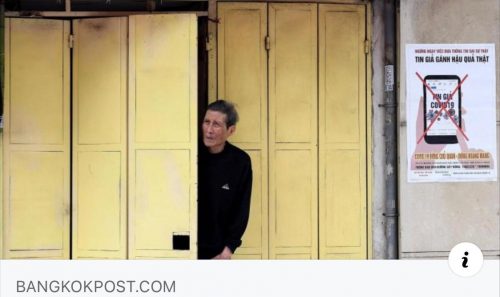
“Covid Crisis Stifles Political Criticism in Southeast Asia”
On 27 May 2020, Asia Centre’s Drs James Gomez and Robin Ramcharan highlighted the threat of fake news laws in the Bangkok Post. They warn that there is a danger that self-censorship of political criticism will become normal in a post-Covid-19 Southeast Asia. They advise that civil society organisations, international institutions and the mainstream media must try to ensure this emerging “new normal” does not take root.
Read the article here.
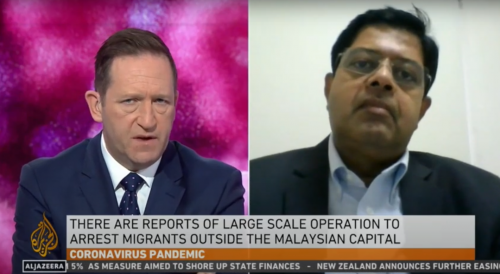
“Dr. James Gomez on Al Jazeera News on rights of Malaysia’s undocumented workers.”
On 11 May 2020, Asia Centre’s Dr. James Gomez spoke to Al Jazeera on its News Hour commenting on the Malaysian government’s raid against undocumented workers in Kuala Lumpur. Dr. Gomez pointed out that in addition to the federal government, mucipal authorities and employers need to be held accountable for the rights of undocumented workers. He added that the rights of undocumented workers in the largest construction project of the Iskandar region in the southern state of Johor, also requires attention.
Watch the interview here.
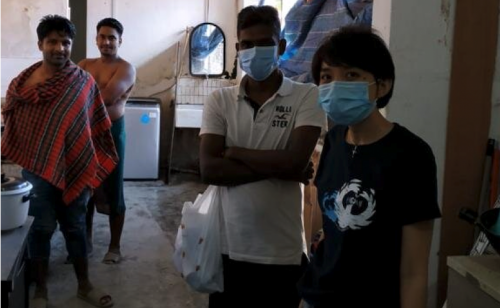
“Migrant workers bear brunt of Singapore’s COVID-19 ‘second wave’ “
On 6 May 2020, Asia Centre’s Dr. James Gomez said in Australia’s Green Left, “the COVID-19 pandemic is showing the difficulties faced by vulnerable communities, such as indigenous people, refugees, migrant workers and those working in the informal economy”.
Read the article here.
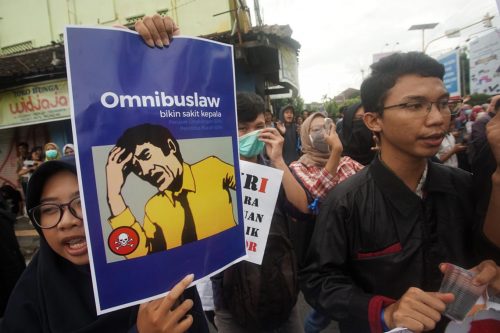
“COVID-19 Shrinks Civic Space in Southeast Asia”
On 25 April 2020, Asia Centre’s Drs James Gomez and Robin Ramcharan caution in the Jakarta Post, “ Limitations on movement, on assembly, on public gatherings and on free speech have severely curtailed the operations of frontline civil society organizations. Recapturing civic space, post-COVID-19, needs to be of deep concern.”
Read the article here.

“Asian Media Battles Officials to Report on Coronavirus”
On 17 April 2020, Asia Centre’s Dr. James Gomez, in a report by Voice of America – VOA – said, “Internet” “trolls” – some appointed by governments, while others are ideological – disrupt a lot of alternative media messages. He added, emphasizing officials themselves use the term “fake news” to label reports they don’t like.”
Read the article here.

“ASEAN+3 Summit necessary for regional cooperation in addressing dual crisis: Thai experts”
On 13th April, Dr. Robin Ramcharan was asked by the Vietnam News Agency to comment on the recent ASEAN +3 Summit. Dr. Robin Ramcharan noted Vietnam’s proactive chairmanship of ASEAN amidst the COVID-19 crisis has helped to preserve ASEAN unity and cohesiveness.
Read the article here.
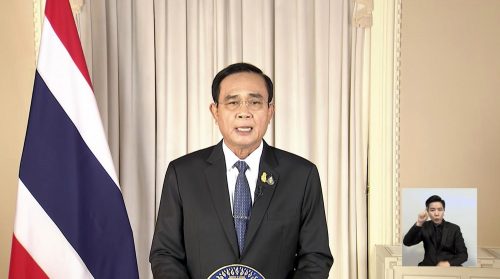
“Coronavirus and Democracy in Southeast Asia“
Asia Centre’s Drs James Gomez and Robin Ramcharan write in the Bangkok Post: ” Coronavirus is affording regimes with authoritarian tendencies the opportunity to suppress political expression, enforce strict obedience and consolidate their rule.”
Read the article here.
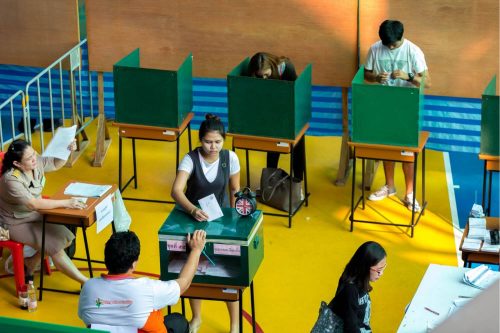
“Democracy in Southeast Asia: Elites are an obstacle“
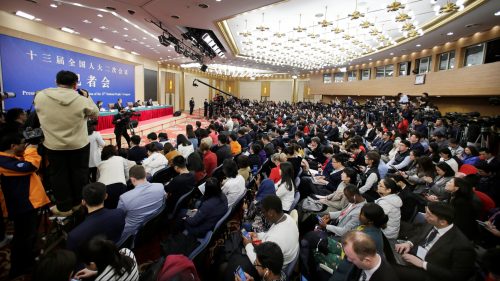
“China expelled WSJ journalists because it cannot bear criticism”
Read Asia Centre’s Oped in Nikkei Asia Review written by Drs James Gomez and Robin Ramcharan. The authors argue that the international community and media organizations need to strongly condemn Chinese censorship actions and speak up in support of front line media workers.
Read the article here
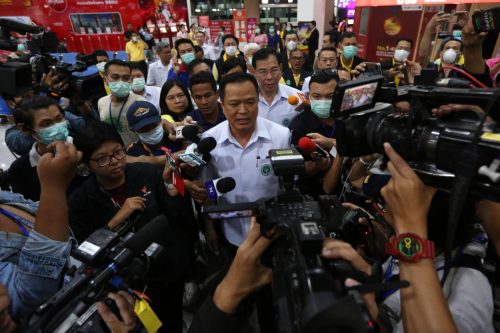
“Journalism suffers existential crisis”
Read Asia Centre and Oxfam in Asia´s joint Op-Ed written by James Gomez and Nipuna Kumbalathara on how journalism can overcome the industry-wide existential crisis by focusing on issues that matter to people by going back to the basics of what makes a good reporter: curiosity, integrity and boldness
Read the article here
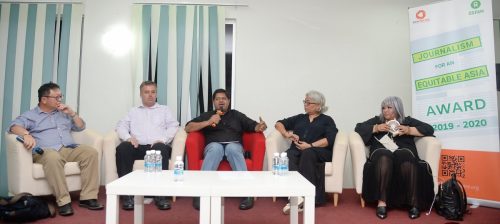
中國報: Datuk Wong Sai Wan asked, “How can media survive without financial support after the Regime Change?”
Malaysia’s China press reported on the 18 December 2019 joint Asia Centre and Oxfam Malaysia Launch: Journalism for an Equitable Asia Award. The report highlighted Malay Mail’s Editor-in-Chief, Datuk Wong Sai Wan suggestion that the award should consider the “sponsors” behind each media. As this feature presently distinguishes most of ASEAN’s media which are “sponsored” compared to current Malaysian media which is no longer “sponsored”.
Read the article here

星州日报:After National Front Lost Elections, “Many Media also lost financial support”
Malaysia’s Sin Chew press, reported the 18 December 2020 Asia Centre and Oxfam joint Malaysia Launch : Journalism for an Equitable Asia Award. The report highlighted Malay Mail’s Editor-in-Chief, Datuk Wong Sai Wan observation that the National Front used to subsidize many of Malaysia’s media but these media companies suddenly lost financial support after the National Front lost the election.
Read the article here

Looking Ahead to Next Year: Southeast Asia’s Big 2020 Elections
“As James Gomez of the Asia Center in Bangkok has shown, recent election seasons in Cambodia, Indonesia, Malaysia and Thailand have included politicians, faith-based groups and other actors using disinformation to mobilize political supporters. He believes that Myanmar could easily fall into the same pattern.”
Read the article here
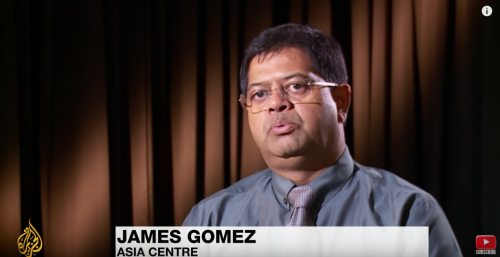
Aung San Suu Kyi to appear at ICJ as Myanmar faces genocide case
On 3 December, Dr. James Gomez spoke with Al Jazeera English on Aung San Suu Kyi’s image declining in the eyes of the international community. Dr Gomez argued that, while in the past years the international community sympathized with her more, this has turned to disappointments due to her defence of the use of #Myanmar’s armed forces against the #Rohingya situation. With the #ICJ case, we should expect to see a rise of hate speech against the #UN, INGOs and activists who call for accountability for the genocide committed against the Rohingyas.
Watch the interview here

Hate speech intensity and trajectory could shift in Myanmar 2020 elections
Dr. James Gomez’s interview was published, 30 November, in Mizzima English on hate speech in Myanmar and its effects on the upcoming election.
“In the Myanmar case, ethnic and religious based hate speech stands to morph along the lines of political ideology and values, and this requires special attention and remedial action in the run up to the November 2020 election”.
Read the interview here
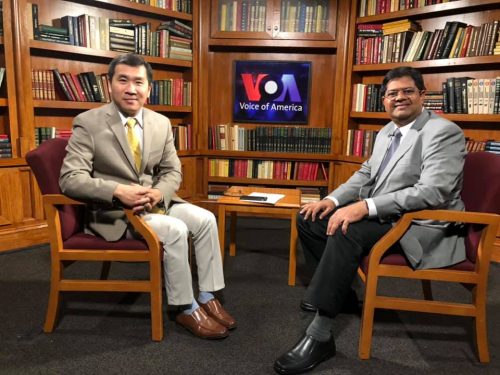
Expert Concerns Over Rising Fake News and Hate Speech in Southeast Asia
Dr. James Gomez was interviewed by Men Kimseng of VOA Khmer in Washington on 18 October. They discussed how fake news in Southeast Asia can often lead to hate speech against marginalised groups and political opposition. Dr. Gomez informed that fact-checking, political literacy and quality journalism could partially help to mitigate the problem.
Watch the interview here
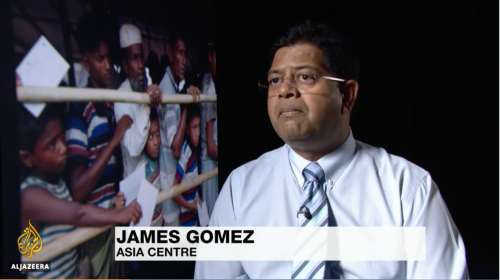
Economics expected to overshadow human rights in ASEAN summit
On 2 November, Dr. Gomez was interviewed by Al Jazeera on the sidelines of the ASEAN summit. Dr. Gomez argued that some governments and INGOs in trying to find pathways to access Myanmar economically and are in the process compromising and trading down the political rights of the Rohingya community. Such governments and INGOs need to be identified and called out.
Watch the interview here.

Heavy price to pay for spreading fake news
Dr. Gomez spoke to the 89.9 BFM: The Business Station on 3 October 2019 regarding Singapore’s new “Protection from Online Falsehoods and Manipulation Act” which came into act recently.
As evidenced by events leading up to the new law now put into place, Dr. Gomez said government critics and civil society activists are likely to remain the prime targets in the run up to the city-state’s next general elections.
Listen to the podcast here.
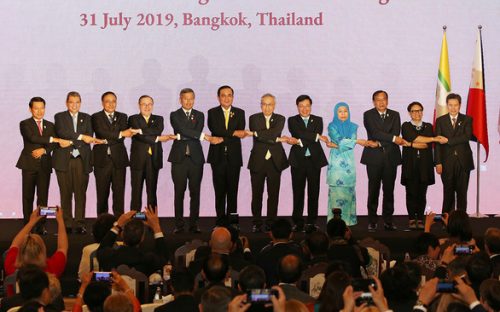
ASEAN unity and the South China Sea
Dr. James Gomez was interviewed by journalist Du Nhat Dang from the Vietnamese newspaper Tuoi Tre on August 7 2019. Dr. Gomez pointed out that ASEAN unity is increasingly subverted by China’s influence over Cambodia and Laos. He suggested that it’s best ASEAN members and other external powers adhere to the United Nations Convention on the Law of the Sea (UNCLOS) and the principle of Free and Open Indo-Pacific to avoid open conflict.
Read the interview here.

ASEAN Members’ should hold their ground and not give into China
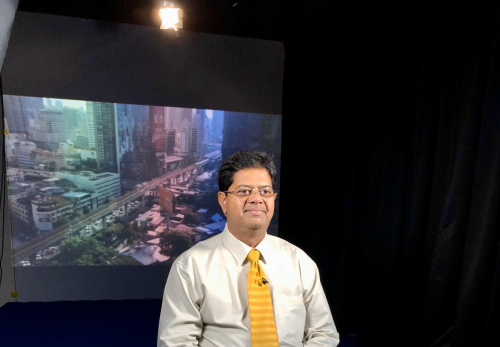
Response to US Sanctions Against Myanmar Generals and International Criminal Court Investigations into the Rohingya Refugee Crisis
Dr. James Gomez was live on Al Jazeera – قناة الجزيرة on 18 July 2019 to comment on the US sanctions against the Myanmar generals and their family from entering into the US and the arrival of the International Criminal Court delegation in Dhaka to open an investigation into alleged crimes against the Rohingya people in Bangladesh and in the Rakhine state of Myanmar.Responding to the US sanctions on the top four Burmese generals, Dr Gomez says it is only a symbolic sanction and not effective as most Burmese prefer to consider countries like Japan, Singapore, South Korea, Thailand as their first preferred destination for healthcare, holidays, study and work then the US. With regards to the ICC investigation, Dr. Gomez questioned whether the Bangladesh government will fully cooperate with the ICC as it risks worsening relations with its neighbor Myanmar.
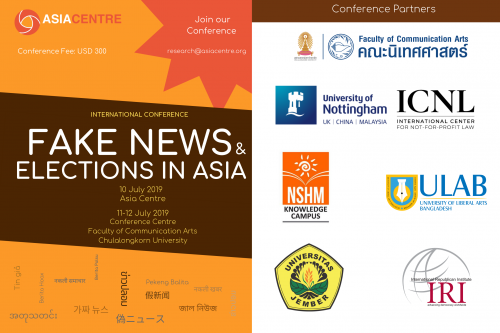
The Balance Between Authenticity and Stifling Expression
Asia Centre‘s Int. Conference on Fake News and Elections in Asia was featured in Ice Business Times on 20 June 2019. In the article Asia Centre’s Conference Coordinator Tessa Alleblas explained the motivation behind legal developments surrounding fake news, noting that “Governments have argued that such legislation is in particular necessary in the run-up to elections as fake news or disinformation has the power to sway voters during the campaign period as well as fuel communal violence.”
Read full article here

“Fake News”: A New Weapon against Dissidents in Southeast Asia
Dr. Gomez’s oped published on 13 June 2019 for International Centre for Nonviolent Conflict on how Southeast Asian governments are dismissing as “fake news” critical opinions, research findings, and news content that are not in line with the government stance.
Read full article here
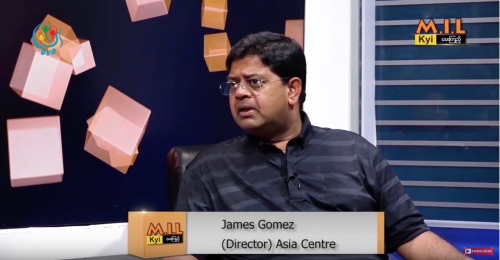
Media Literacy Programme on Disinformation in Myanmar
Dr. James Gomez was interviewed by Myanmar’s DVB TVnews on 8 June 2019 for a media literacy programme on what constitutes disinformation and fake news. During the interview Dr. Gomez explained the different types of disinformation campaigns and how it relates to Myanmar’s 2020 general elections. He noted that internet penetration will continue to grow and this will impact traditional mainstream media shape and how news will be consumed during the elections. Last but not least, Dr. Gomez offered suggestions such as enlisting the young generation to help with peer fact-checking.
Watch interview here

Singapore’s fake news law: a lesson to Asia in stifling dissent?
Dr. Gomez on 9 May 2019 provides an insight into the reasons given by states to introduce fake news laws. “Using the argument of maintaining social harmony to pass legislation to control hate speech.Operationally, such laws are often used to curb political criticism of long standing regimes. You often see this played out during elections”
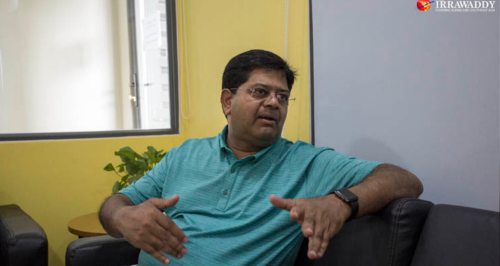
The Role of Fake News in Politics, Stability and Elections
Legislation is being introduced across Southeast Asia to combat fake news in the name of preserving social harmony. In practice, however, it is too often used by long-sitting regimes as a tool to discredit political opponents ahead of critical events such as elections and referendums. As a result, democratic values like freedom of expression and press freedom are directly impacted by legal retaliation to what governments call “fake news” written by their critics.
Read Dr James Gomez’s interview with the Irrawaddy on World Press Freedom Day 3rd May 2019 here.
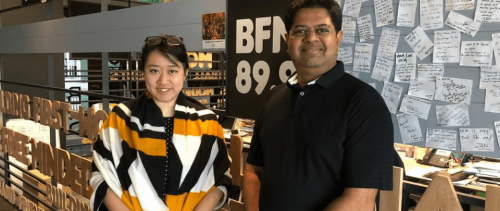
From Fake News To Fake Elections
Dr. James spoke to the 89.9 BFM: The Business Station about the fake news legislation in the region, its impact on elections and the intersection of disinformation and false election results with Lyn Mak in Malaysia on 22 April 2019.
Listen to the interview here.
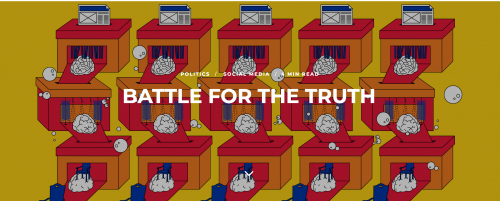
Battle for the Truth
Governments across Asia, namely in Thailand, Indonesia, Japan, the Philippines, and India, are considering ways to tackle the problem of disinformation on social media, particularly as they gear up for crucial elections in 2019.
Read Asia Centre’s mention in the article on 16 April as Dr Gomez focuses on how in Malaysia, an anti-fake news bill was passed in April 2018, before the general election which was designed to “shape and manipulate online discussion in favour of Najib Razak’s government during the election period.
Read the article here.
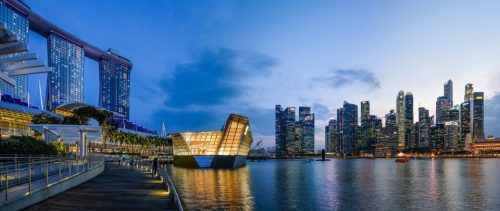
Falsehoods, Facebook, and First-time Budgets
Listen to the full interview here
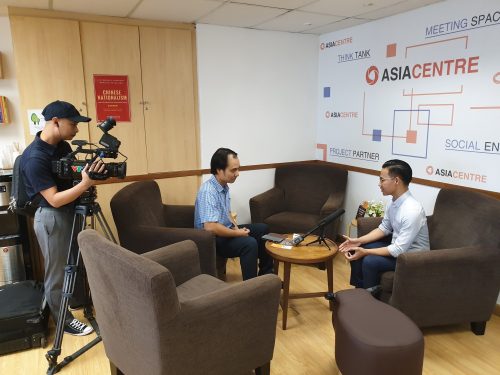
Post-election period in Thailand
Asia Centre’s programme coordinator Yawee Butrkrawee gave an interview to Nguyen Ngoc Phuong from Vietnam Television during 28th March 2019 on the post-election period in Thailand, the likelihood of coalition government and the impacts on Thailand’s foreign policy. He also noted the unprecedented fake news/ online disinformation during the period leading to the election and the roles of youth in Thai politics.
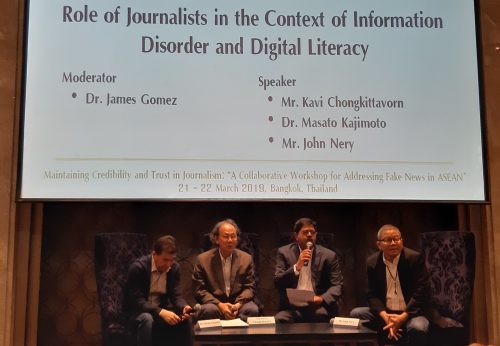
Quality journalism key to fighting fake news
Dr. James Gomez spoke to the Philippine news agency on 22 March 2019 as moderator the panel discussion on the role of journalists in the context of information disorder and digital literacy at the ASEAN Workshop for Addressing Fake News. However, Dr Gomez also said over criminalization” or excessive laws and regulations and vaguely-worded legislation result in legal battles between government officials and individuals or other stakeholders.
Read about the discussion here.
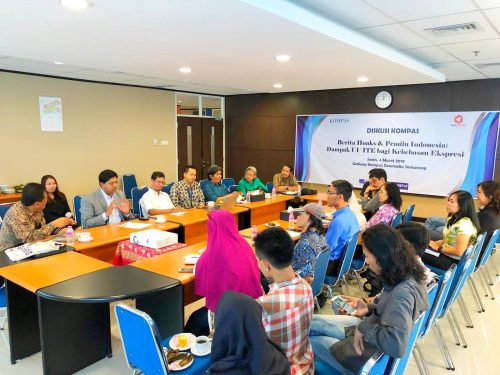
The Community is Comfortable with Fake News that is Sensational
On 4 March 2019, Dr. James Gomez was hosted by the Kompas Daily office in Semarang, Indonesia to speak to journalists at a media literacy roundtable. During that discussion, Dr. Gomez pointed out that the spread of false news is still rife due to unclear regulations and lack of quality filtering in the use of social media. Further, that sensational fake news attracts people to read and share them. The event and contents of the discussion was reported in Bahasa Indonesia, “Masyarakat Masih Senang Kabar Bohong yang Sensasional”.
Read the full article here.
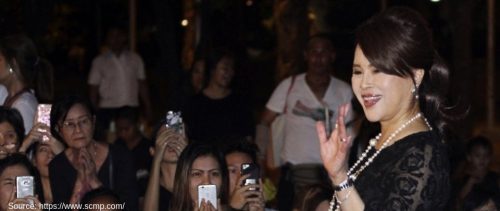
A Right Royal Rumble – Palace Pushes Princess Out Of Race
Dr James Gomez was interviewed on 11 February 2019 by 89.9FM The Business Station on the electoral developments in Thailand following the nomination by Thai Raksa Chart Party of Princess Ubolratana as a Prime Ministerial candidate.
Listen to the full interview here
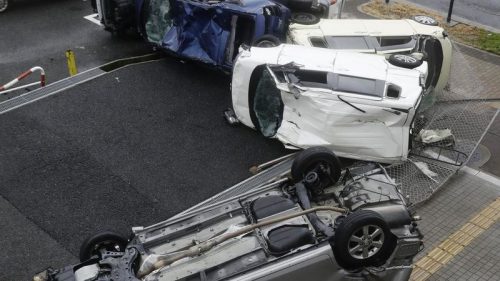
In the name of ‘fake news,’ Asian governments tighten control on social media
In February 8 2019, Dr. James Gomez was quoted in the LA times. James Gomez said “Government officials in Southeast Asia are focusing on social media commentary that causes “reputation harm” to themselves and their institutions, Unlike in the U.S., where Trump is attacking to do reputation damage to the fact-based traditional media,” he said, “in Asia, government representatives are focused on discrediting critics.”
Read the full article here:
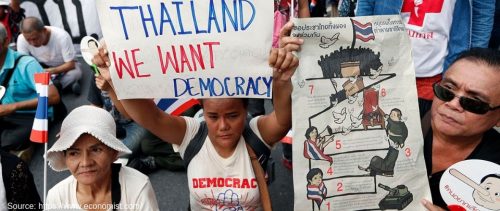
Election Watch – Thailand’s Democratic Test
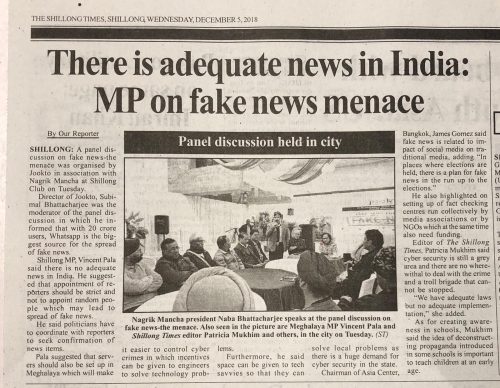
Panel discussion – Fake News The Menace
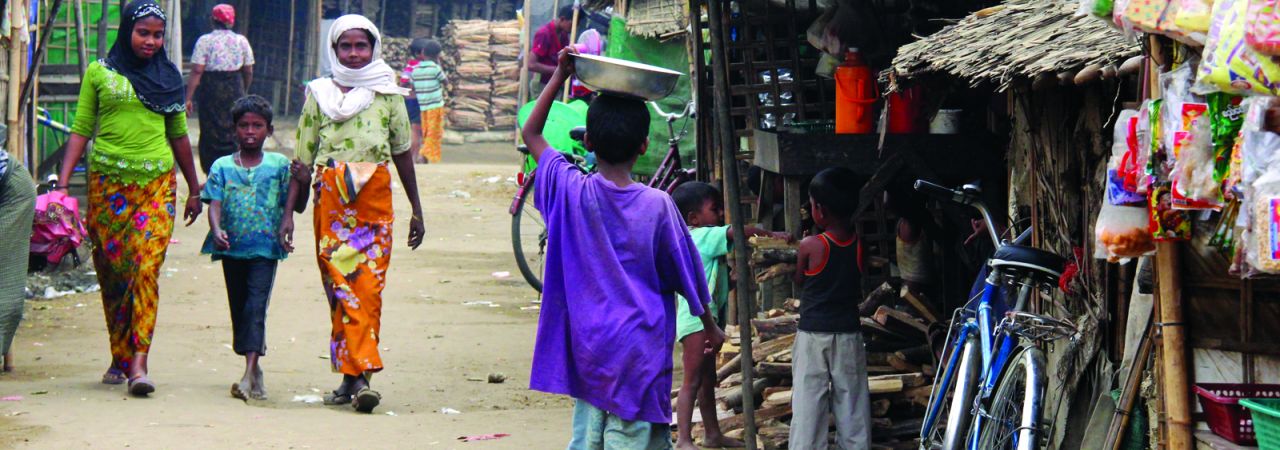
Role of ASEAN in the refugee crisis
On 5 November 2018, Dr. Gomez was interviewed by Lynda Chanwai-Earle, a researcher from Asia Media Centre at the Asia New Zealand Foundation. Key issues discussed about the Rohingya refugee crisis included forced migration, human trafficking and regional resistance to engage.
Read full article here.
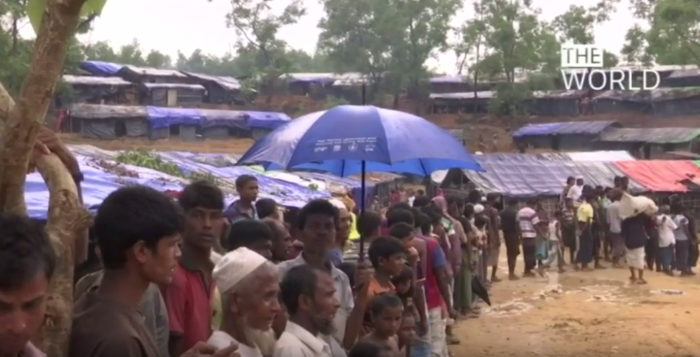
Dr Gomez speaks to ABC News on the Rohingya Refugees
Dr. James Gomez spoke to the ABC News (Australian Broadcasting Corporation) from Tokyo on Friday, 28 September 2018 on the Rohingya issue after the Canadian parliament voted to strip Myanmar’s Aung San Suu Kyi of honorary citizenship.
Watch the video here.
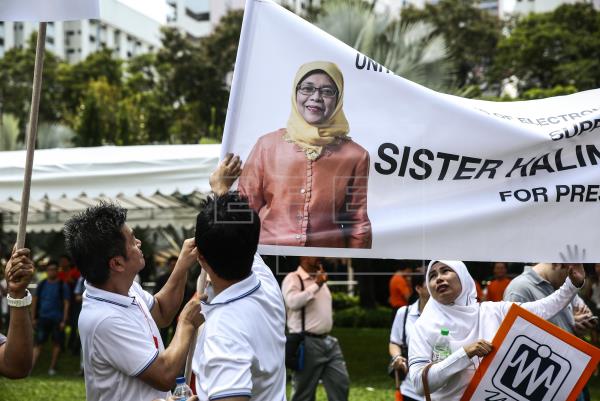
Halimah Yacob takes on the role of the President of Singapore
Dr Robin Ramcharan, Executive Director was interviewed by Agencia EFE on 13 September 2017, a Spanish News Agency on his comments of the change in constitutional roles as Halimah Yacob takes on the role of the President of Singapore. He welcomes the change in a male dominated political role and says becuase of her work as an MP in women’s issues and the Muslim community will make her transition to becoming the president smoother.
Read more here.

Lee Family Feud – Larger Significance?
Dr Robin Ramcharan, Executive Director, spoke to BFM 89.9 on July 2017 The Business Station regarding the younger siblings of Singapore’s prime minister, Lee Hsien Loong who had released a six page statement accusing the premier of betraying the legacy of their father, Lee Kuan Yew. Dr Ramcharan questions whether this has a larger political consequence.
Listen here
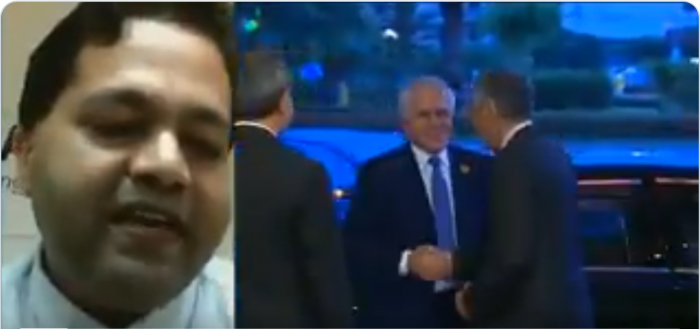
Singapore PM Lee is engaged in a very public spat with his siblings over their father’s will
Dr Robin Ramcharan, Executive Director was interviewed by the ABC News (Australian Broadcasting Corporation) in regard to the family spat of the younger siblings of the Singaporean Prime Minister. He comments this family spat is not ordinary as it concerns the trajectory of the state.
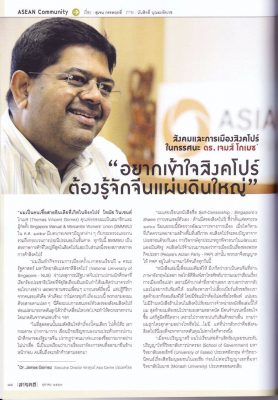
Sarakadee Magazine interview of Dr. James Gomez
In October 2016, Dr James Gomez was interviewed by Mr Sujane Kanparit for Sarakadee Magazine. He talked about his previous political engagement when he studied at the National University of Singapore in the late 1980s and his political campaigns in the 2000s. His main argument was that in order to understand Singapore, we must first understand Mainland China as political culture of Singapore has been influenced by Chinese tradition of being conservative and self-censorship. Dr Gomez also introduced Asia Centre as part of his academic contribution which aims to connect people in Southeast Asian region for intellectual exchanges.
